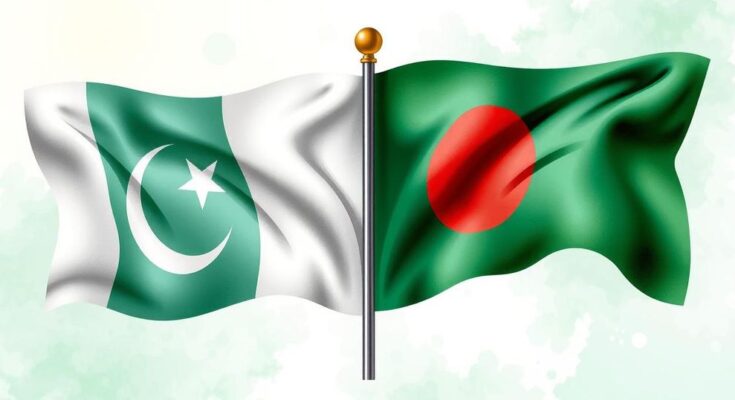Pakistan’s Foreign Minister Ishaq Dar is to visit Bangladesh next month, the first visit since 2012, signaling improved ties after Sheikh Hasina’s ouster. Muhammad Yunus, the interim chief adviser, will also visit Pakistan. Relations have strengthened, seen in lifted trade restrictions and recent policy changes regarding visa requirements for Pakistani citizens. Regional dynamics amid India’s interests remain complex.
The Foreign Minister of Pakistan, Ishaq Dar, is scheduled to visit Bangladesh next month, marking the first visit by a Pakistani foreign minister in over a decade. This impending trip signifies improving relations between Dhaka and Islamabad, especially following the removal of Prime Minister Sheikh Hasina in August last year.
Dar’s visit, set for February, is at the invitation of Bangladesh’s foreign minister. It is noteworthy that this will be the first visit since Hina Rabbani Khar’s trip in 2012, during which she invited Hasina to the D-8 summit. In addition, Muhammad Yunus, the chief adviser of Bangladesh’s interim government, has accepted an invitation to visit Islamabad.
During the tenure of Sheikh Hasina, relations between Pakistan and Bangladesh were notably strained, primarily due to her close alignment with India. Despite attempts by Pakistan to mend ties, there was little reciprocation, as Hasina was favored by India in regional stabilization efforts.
Following Hasina’s ouster, however, it has been reported that relations have begun to thaw. High-level exchanges are occurring, and Bangladesh has lifted restrictions on imports from Pakistan, which has led to a notable increase in bilateral trade along with the initiation of direct maritime trade.
In a recent press conference, Ishaq Dar characterized Bangladesh as a “brother country” and emphasized Pakistan’s commitment to supporting Dhaka. Furthermore, the interim government of Bangladesh has removed the security clearance requirement for Pakistani citizens seeking visas, a move that might impact India’s northeast security context, particularly concerning extremist activities.
The lifting of the policy came just prior to a significant meeting between Pakistan’s high commissioner and the Bangladesh Nationalist Party leader, Khaleda Zia, who has historically upheld stronger ties with Pakistan than Hasina’s Awami League.
Relations between India and Bangladesh have increasingly deteriorated following Hasina’s departure amid large protests and her eventual exile in India. As tensions rise, especially with Muhammad Yunus in power, the political climate has become increasingly strained, highlighted by recent attacks on minorities in Bangladesh.
In summary, the upcoming visit of Pakistan’s Foreign Minister to Bangladesh signifies a notable shift in diplomatic relations following the removal of Prime Minister Sheikh Hasina. Improved ties are punctuated by high-level exchanges, increased trade, and a shift in visa policy for Pakistani citizens. The evolving political landscape in Bangladesh, particularly under Muhammad Yunus, continues to resonate through regional dynamics involving India, necessitating close attention.
Original Source: www.business-standard.com




